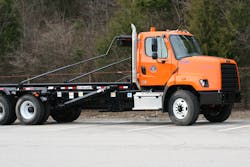Vocational Profile: Data-driven success
With nearly 4,000 assets under its umbrella, the Louisville Metro County Government fleet operation benefits from standardized maintenance and procurement practices. At the same time, the combined fleet operation of the governments of the City of Louisville and Jefferson County, KY, faces equally large challenges.
“Like any municipal fleet, funding for replacement vehicles used by public works, fire, emergency services, and other departments is always a concern,” Matt Maskey, assistant director of fleet services, says. “The recession of a few years ago reduced spending levels and forced us to slow down replacement cycles. Today, we’re catching up and trying to keep up with planned life cycles.”
Buying about 100 non-first-responder vehicles or pieces of equipment annually, Louisville Metro balances needs based on available capital. “If we need a large number of medium- or heavy-duty trucks, which cost more per unit, we may have to limit purchases of light-duty trucks, SUVs, and sedans,” Maskey explains. “The key to making effective choices is to look at total cost of ownership, including data on maintenance, labor, parts and fuel costs, not just replacement costs.”
Since 2003, when the Louisville and Jefferson County fleets were combined into a single operation, Louisville Metro County Government Fleet Services has used FleetWave management software from Chevin Fleet Solutions for that information.
“With real-time data visibility into information, we can more efficiently manage the fleet . . . and make better long-term decisions,” Maskey relates. “One area where we have seen strong improvement is in parts management and purchasing.”
Louisville Metro is realizing better accountability over parts purchases by integrating its fleet management software with financial applications and with external parts suppliers’ systems. The software creates a three-way connection between management, technicians, and personnel at NAPA IBS-run parts rooms in the fleet’s shops. With the integration, a direct link is used to electronically send parts requests from work orders, and data is consolidated for billing user departments.
“We no longer have to manually import parts data, which is an error-prone and time-consuming process,” Maskey says. “The integrated software also lets technicians and supervisors review and approve parts on repair orders, and through a portal user department can see what’s happening with their vehicles and equipment.”
Parts management is just one of the areas where the combined Louisville Metro fleet is consolidating activities. Another is in staffing its two shops—one that handles sedans and SUVs and the other trucks and equipment.
“Finding well-qualified technicians is an industry issue,” Maskey says. “One thing we’ve been doing successfully is building relationships with area schools that offer diesel technology programs, The last four or five technicians we’ve hired have an associate degree, and we learned about them based on the recommendation of their instructors.”
Effectively managing a combined fleet of 2,600 licensed vehicles and over 1,300 pieces of equipment is a big challenge for Louisville Metro County Government Fleet Services. With standardized processes and full data visibility, however, the operation is successfully realizing lower costs and enhanced utilization.
